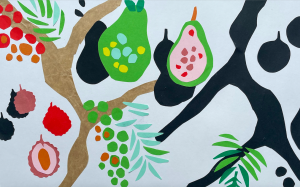What Do You Do With Your Last Day At Home?
by Treya Agarwal | January 24, 2024
Who do you see? There’s so much pressure to say goodbye to people; you might not see them for 6 months, for a year. Some of them are staying behind; some of them are flying even further away. What do you eat? Will I miss aloo parathas or dosas more? How can I decide? What do I pack? What bits of home do I need to have? Everything?
There is a curious feeling of limbo, of the in-between-space when I leave my home to fly to Oxford. I’m not quite gone yet, but suddenly everything seems so fleeting. Isn’t it insane, that I’ll climb into an air-conditioned tube with 500 other people, and 8 hours later, I’ll be in a different country, on the very same day?
My life in India is steeped in the known, the worn-in comfort only years can bring. In the left turn I remember in my sleep; in the clerk at my favorite restaurant who says I look more like my mother every day; in friends’ mannerisms so ingrained, knowing them is like knowing how to breathe. Everything sparks recognition; everything is known.
When will I sleep in this bed again, when will I see my mom again, look out of the window at the palm trees and vines, feel the polished wood of the banister as I run down the stairs, lie down on the frayed green and pink fabric of my favorite rug?
And yet. Oxford has also acquired that weighty title, ‘home’. Its cobbled lanes and Ahmed’s chips and sunsets have worked their way under my skin and settled firmly against my bones, claiming undeniable belonging. And it is strange, a betrayal of some sort. I first saw it in the shock on a friend’s face when I casually referred to returning to my college room as returning home; the indigestible idea that I felt I belonged there equally. Calling Oxford home is emblematic of the end, of the final shift and closure, of 18 years of not knowing any other home other than Bombay. It is a wobbly realization, accompanied by intimidating whispers of adult life and twenties and change.
I forget the feelings of lived experience of India when I’m in Oxford. Here, I don’t miss anything (other than maybe aloo parathas). Here, my life is so full and busy and packed that I barely even remember what living at home is like. Here, my friends from school, my parents, are faraway characters, tiny, tinny voices on the phone.
Everything is different, split between these two places. The language; the social norms; the way people say hi to you in the street, the way the air smells in the morning, the experience of race, and of class. All of the characters in my life are different; there is almost no overlap. It’s like having two Netflix shows playing on split-screen on your laptop; as one pauses, the other begins to play right where you left off. And while you’re watching each show, when you’re in it, living it, the other seems so, so fake.
If you change everything about the external quality of a person’s life: their friends, accent, language, food, lifestyle, social norms, seasons, clothing – are they even the same person anymore? Yes, they go by the same name; yes, they have the same body; but what does this bifurcation do to the internal consistency of a person’s personality? Is it even possible to maintain?
Is it dishonest of me to behave differently at university? To have, however subconsciously, a different accent and different mannerisms? To tone down my personality to British levels of decorum? To say ‘alright?’ for ‘hello’? Am I, God forbid, assimilating?
It is the perception of change that bothers me most; it is realizing that what is passing will end, that my life for the next months will be qualitatively different. It is this realization that makes me cling to it, reaching out to grasp at all the insubstantial humidity of Bombay’s air, of my best friend’s giggles, the feeling of watching bad movies with my mom on the blue sofa, and that smell of the sun-baked air next to the sea, my fingers scrabbling in empty space.
I am being removed; I am being ripped out, torn, with uneven edges on both sides; both when I leave home for Oxford and leave Oxford for home. How do you exist when half of your life is going on somewhere else, when the show doesn’t pause for you? How do you explain to anyone on either side what the rest is like? How do you know which one is real, permanent, home?
The question resurfaces, persistent, as I ache for college puffers and formal hall in India; and as I adorn my college room with an obnoxious number of photos from home. As I watch as cars of various, enthusiastic parents carrying far too many boxes pull up in front of Corpus, a queasy reminder of the 5,038 miles-long expedition that separates me from my own. Homesickness is anathema to me; it is an admission of an inability to adapt to life at university; to take advantage of the myriad, wonderful, weird brilliances of Oxford. The possibility of being the Indian International Student™, who spoke exclusively to other friends from home, simply transporting South Bombay’s small social circle to their university city; who refused to integrate, and take advantage of the socioeconomic variety that university life has to offer, repelled and disturbed me. And yet, on each last day, in Oxford or in India, homesickness hits me like a truck, oddly enough, for the place I have not yet left.
Leaving this time around was, as usual, painful, uprooting, and in some sense, volatile – not helped by the 6 hours of driving, 11 hours of flying, and 40 kgs of luggage. But it was, for the first time ever, also reassuring. A year and a half of the whiplash of relocation has forced me to think more long-term. I was leaving, yes. But to return, as always, eventually. Neither city is going anywhere. They will stand; change as I change, and yet hold my memories all the same. The left turns, and the restaurant that knows my family, and my friends’ faces will always let me find home in them. Perhaps home is not so singular; not so definitive that one must clutch, white-knuckled, at it as it flies away. Perhaps I can put it down gently, without shaking and upending, and pick it back up when I want, wherever I want, reveling in the joy that it waits for me.∎
Words by Treya Agarwal. Photo taken by Treya Agarwal.




